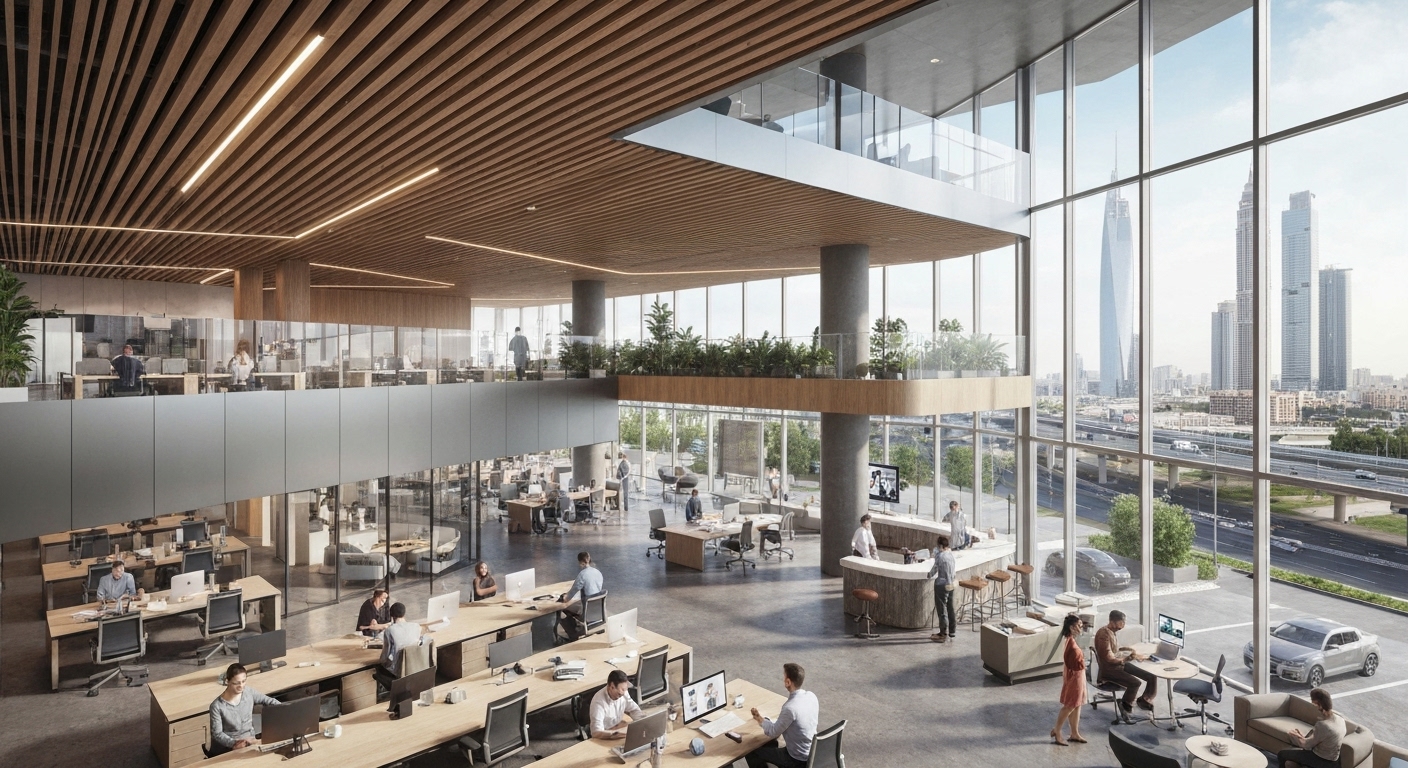The Rise of Co-Working: Understanding the New Demand Landscape
The co-working sector has transformed from a niche market to a mainstream commercial real estate phenomenon, driven by fundamental shifts in how we work. With approximately 90% of UAE employees preferring remote or hybrid work setups, the demand for flexible workspace solutions has reached unprecedented levels.
This transformation reflects broader economic changes. Hybrid positions have increased by 117% since 2023, now comprising nearly two-thirds of all professional job listings across industries including finance, healthcare, and technology. The traditional office model is evolving rapidly, creating substantial opportunities for property investors who understand this shifting landscape.
Why Property Investors Can No Longer Ignore Co-Working Spaces
Commercial real estate returns in Dubai’s flexible workspace sector are compelling. Current market data shows projected rental yields of 6.5-8% in premium commercial sectors, significantly outperforming many global markets where returns have compressed to 3-4%.
The numbers tell a powerful story. By mid-2025, more than 300 hybrid workspaces will operate across Dubai, triple the number from 2023. This expansion isn’t driven by speculation but by genuine demand from a workforce that has permanently embraced flexible working arrangements.
Property investors benefit from multiple revenue streams in co-working developments: membership fees, meeting room rentals, event hosting, and value-added services. This diversified income model provides greater stability compared to traditional long-term leasing arrangements.
Identifying Lucrative Co-Working Investment Opportunities and Locations
Strategic location selection remains paramount for co-working success. The most profitable opportunities exist in mixed-use developments where commercial properties sit adjacent to thriving residential communities. These integrated environments create natural ecosystems that support both live-work lifestyles and professional networking.
Three emerging workspace models dominate the landscape:
- Neighborhood hubs in residential communities that reduce commute times
- Collaboration centers optimized for team meetings and creative work
- Industry clusters where professionals from complementary fields network while maintaining flexible schedules
Areas near major business districts, transport hubs, and lifestyle amenities consistently demonstrate higher occupancy rates and premium pricing power.
Key Considerations for Developing and Managing Co-Working Properties
Successful co-working properties require sophisticated infrastructure beyond traditional office specifications. High-speed connectivity, flexible layouts, advanced booking systems, and integrated technology platforms are essential foundations.
The most successful developments incorporate:
- Premium Grade A spaces with smart building technology
- Multiple workspace configurations from hot desks to private offices
- Professional amenities including meeting rooms, phone booths, and presentation facilities
- Hospitality-grade common areas that encourage networking and collaboration
Management expertise proves equally critical. Co-working operations demand hospitality-focused service delivery, community building capabilities, and technology-enabled member experiences that traditional property management approaches cannot provide.
Mitigating Risks and Maximizing Returns in the Co-Working Market
While co-working offers attractive returns, investors must address specific risk factors. Member acquisition costs, occupancy volatility, and operational complexity require careful management strategies.
Diversified tenant bases across industries and company sizes provide stability. Properties serving both corporate clients seeking satellite offices and individual professionals maintain steadier occupancy through economic cycles.
Financial modeling should account for higher operational expenses compared to traditional leasing, including technology infrastructure, utilities, cleaning, and community management costs. However, the premium pricing and multiple revenue streams typically offset these additional investments.
Future-Proofing Your Investment: Trends Shaping the Co-Working Sector
The co-working sector continues evolving toward more specialized and sophisticated offerings. Wellness-focused amenities, sustainability credentials, and ESG compliance increasingly influence tenant decisions and investment returns.
Technology integration deepens through AI-powered space optimization, automated booking systems, and data analytics that drive operational efficiency. Properties that embrace these innovations command premium positioning and stronger returns.
The integration of residential and commercial elements in mixed-use developments represents the sector’s future direction, creating comprehensive live-work environments that appeal to Dubai’s growing remote workforce.
Partnering for Success: How Danube Properties Can Guide Your Co-Working Investment
Danube Properties brings proven expertise in developing mixed-use properties with integrated business facilities. Our developments feature working spaces, business centers, and meeting places designed to support modern workplace requirements.
With comprehensive amenities including health clubs, recreational facilities, and professional services, Danube Properties creates environments where co-working concepts can thrive naturally. Our track record in delivering fully-furnished, amenity-rich developments positions us as the ideal partner for investors entering the co-working market.
The co-working revolution presents exceptional opportunities for informed investors. Success requires understanding market dynamics, strategic location selection, and operational excellence – areas where Danube Properties delivers proven results.




